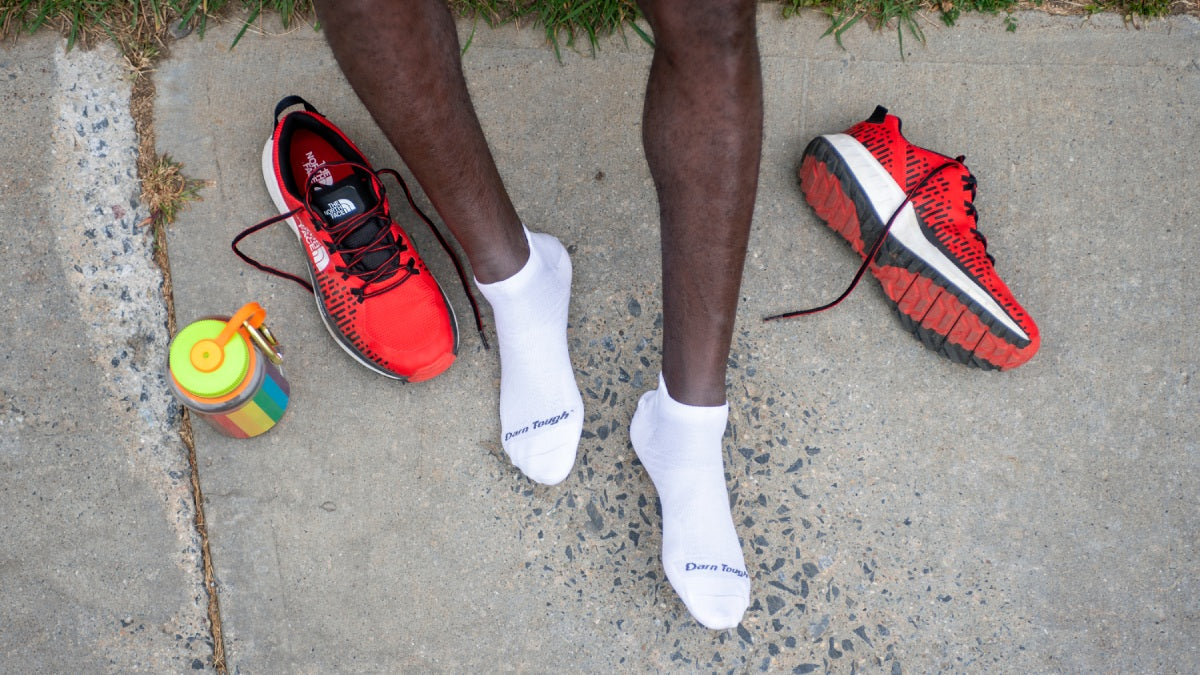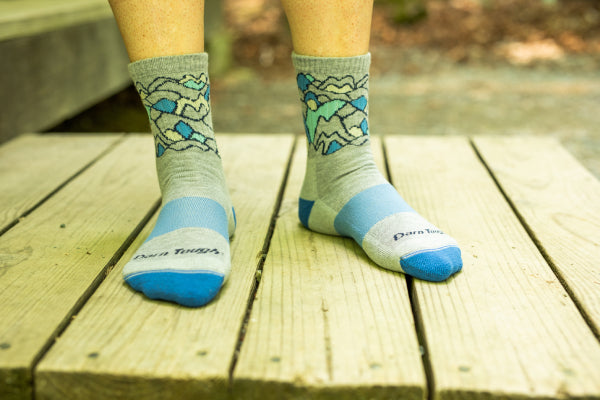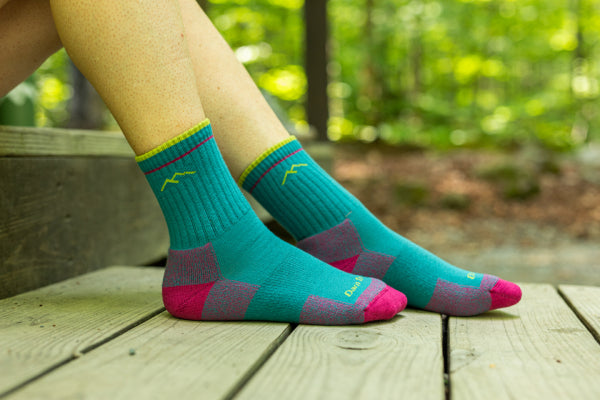Coolmax Socks: What They Are & Why We Knit Them

It’s no secret, we knit the majority of our socks from Merino Wool because it’s the ultimate performance fiber. That said, we do knit some socks in our Hike and Run collection from Coolmax® fibers.
Which might have you wondering… what are Coolmax socks for? Why do we knit these socks? We’re here to answer those questions and address another question we hear from many of you: is Coolmax the summer version of our Merino Wool socks?
The short answer is no — both Merino Wool and Coolmax fabrics work well in the summer. Let’s dive into it.
Merino Wool Vs. Coolmax
Despite common misconceptions, Merino Wool is arguably the best option for a summer sock fabric. Many people believe that since it keeps their feet warm in the winter that they will sweat through them in the summer. This is not the case.
In fact, no material is more tested and proven for hiking and other high-performance activities than Merino, as shown by the Merino Sheep. Sheep have been wearing Merino Wool while hiking and running in all seasons for over 10,000 years. Animals adapt to survive in their surroundings, and this is proven with Merino Wool. That’s why we use it for our socks — Merino’s natural performance features. More on that later.

As much as we believe in Merino Wool, we understand not everyone can wear wool. For this reason, we wanted to make socks from a synthetic alternative that mimics Merino Wool so everyone could enjoy our unconditional lifetime guarantee. Enter Coolmax.
What is Coolmax Fabric?
Coolmax is a specific brand of polyester materials engineered to act as a breathable and moisture wicking alternative to wool. Here at Darn Tough, we offer select styles in our Run and Hike lines as synthetic socks using Coolmax fabric. We designed these for our customers who are unable to wear wool or choose not to wear animal products.
How Is Coolmax Made?
Coolmax is a synthetic fabric made from polyester. It’s made by creating a clear polymer, a “bead-like” blend of materials with similar properties. The polymer is then melted down into a liquid and spun to create fibers.
Next, the fibers are stretched to increase usable material and increase the durability. Finally, the fibers are woven or knit into fabric or garments to be worn.

Why Coolmax?
We chose Coolmax as our synthetic fiber because of how well it mimics Merino’s natural abilities. Darn Tough Coolmax socks are breathable, moisture-wicking, thermoregulating, and durable socks which are great for walking, hiking, and running.
Coolmax socks are much more effective at keeping you dry than cotton, which acts like a sponge. Unlike cotton, Coolmax dries quickly by wicking moisture to help keep your feet dry and blister-free.
Coolmax is a synthetic fiber, and we are on a journey to make our use of it more sustainable by actively working towards the goal of using 100% EcoMade Coolmax in our Coolmax socks. EcoMade Coolmax is made from 97% recycled materials, using recycled plastic bottles and textiles to continue to create a high-performing fabric, but one that’s more sustainable.
We are still working through some existing regular Coolmax inventory, but we are well on our way to that goal and expect our Coolmax inventory to be around 80% EcoMade by the end of 2023.
Comparing Merino and Coolmax
Both fibers have their purpose, and if you’re looking for vegan socks, Coolmax is a great option. That said, it’s worth reiterating just why we believe in Merino as the preferred fiber, for those able to use it.
Merino Wool is thermoregulating, which means Merino Wool socks work like a thermos. If you put warm water in a thermos, it stays warm. If you put cold water in, it stays cold. This is why your feet stay cool in the summer and warm in the winter with Merino Wool.
With Vermont’s temperamental weather — cold and wet one day and warm the next — it’s important that we are prepared for every scenario. It can be difficult to dress comfortably when the weather changes quickly; this is where the power of Merino Wool comes in!

Merino Wool comes by these powers naturally, and though Coolmax does an admirable job imitating them, ultimately Merino takes the prize, as it is more effective at keeping you warm in extreme conditions. The unique fibers help regulate the temperature more effectively than polyester.
And while Coolmax is breathable and moisture-wicking like Merino Wool, Merino Wool has the added benefit of also being anti-odor. The wool fibers trap bacteria and moisture, helping reduce odors and keep your feet less smelly.
Finally Merino Wool will last longer. The wool fibers are incredibly resilient, able to bounce back when you stretch and abuse them. But the good news for those who wear our synthetic socks: both Coolmax and Merino Wool socks are covered by our unconditional lifetime guarantee.
Wrapping It Up
Coolmax is a great alternative fiber for people who can’t wear wool, but want to get as close as possible to experiencing its benefits. We know that many of our friends and neighbors live a vegan lifestyle, but would love to wear a lifetime guaranteed sock!
If you’re looking for vegan ski and snowboard socks, we also knit a few synthetic socks in that category with another synthetic fiber, Thermolite (more on that in a future post).

Whether you choose Merino, Coolmax, or Thermolite, please don’t choose cotton. Cotton is not a good material for hiking or running socks, as it absorbs and holds onto moisture, a recipe for blisters. Polyester fibers are much more effective than cotton at wicking moisture and regulating temperature.
If you are a vegan hiker, or a runner with wool sensitive feet, Coolmax is a great option for you.







